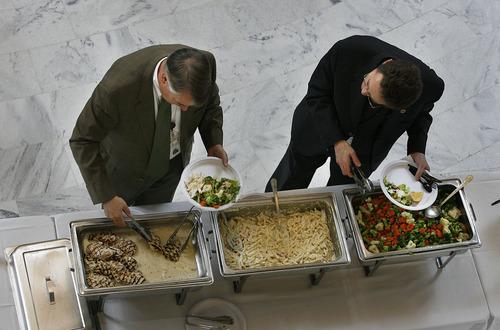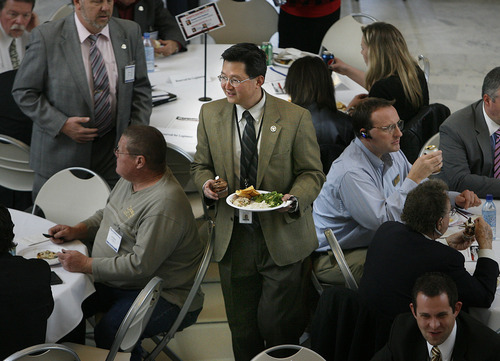This is an archived article that was published on sltrib.com in 2011, and information in the article may be outdated. It is provided only for personal research purposes and may not be reprinted.
Last year, Utah Credit Union Association President Scott Simpson reported spending about $1,000 on food for legislators as he lobbied them. This year he reported spending nothing during the first quarter — when the Legislature was in session.
"Ironically, we did sponsor a lunch this year for all members in the Capitol Rotunda," Simpson says. But he wasn't required to disclose that. A "reform" law passed last year exempts reporting meals (and their cost) if all members of the House, Senate, a committee or party caucus are invited.
So at first glance, lobbyist disclosure forms — which were due Monday at 6 p.m. — seem to show that lobbyist gift-giving was way down this year as the new law took effect. But that may be because of loopholes in what must be reported as much as from any real reductions coming from tighter limits on gifts.
Overall, lobbyists reported giving $6,236 in gifts and freebies to lawmakers this year, down from $71,658 during the first quarter in 2010 — or down by 91 percent.
However, generally not included were amounts spent on 112 different group meals, snack breaks, receptions and family events for lawmakers sponsored by 101 different special-interest groups during this year's general legislative session. The Salt Lake Tribune earlier obtained lists of those events through an open-records law request of lawmakers' social calendars.
Still, the new ethics reform law otherwise ordered lobbyists to disclose the name of any legislator on whom they spent more than $10 in a day for food, drink or other freebies, and the amounts spent. It also bans spending more than $10 on them for such things as tickets to concerts or shows.
"It's gotten to the point that you can't buy them much more than a soda" in individual meetings without reporting it, Simpson said. He adds that most lawmakers don't want to appear in lobbyist reports as receiving freebies, so they are now less willing to sit down with lobbyists individually at meals.
David Nicponski, a lobbyist with multiple clients, adds, "We just do what we can to get a meeting with them. ... When we do go out, they sometimes pick up the check." Nicpon-ski also sponsored a party caucus lunch, and did not need to report it.
David Spatafore, a lobbyist with multiple clients including the Utah Chiefs of Police Association, also did not need to report an annual lunch for lawmakers sponsored by police chiefs. "I also no longer had to disclose the meals that I had with legislators that were under the $10 limit. I didn't have a lot of them, maybe a half dozen or so," Spatafore said.
Some other lobbyists acknowledged privately that some lawmakers escape having their names disclosed on lobbyists' reports by picking up any amounts of lobbyist-bought meals more than $10. (Stan Lockhart, lobbyist for Micron and IM Flash, and husband of House Speaker Becky Lockhart, reported 16 different dinners to unlisted donors of $9.99 each on his forms on Monday.)
Social calendars showed similar moves when it came to concert or show tickets, for which the law allows lobbyists to spend no more than $10 on lawmakers' behalf.
For example, calendars warned members that aJan. 28 Utah Symphony concert would cost them $12 to $36 a person — for tickets with a value of $22 to $46. But calendars told lawmakers that a pre-concert reception at the Bambara restaurant would be free.
Similarly, they were told that a Jan. 27 play, "Born Yesterday" at the Hale Centre Theatre, would cost them $13 per person for tickets that would normally cost $23. A pre-play dinner at Little America sponsored by Intermountain Healthcare was free.
None of that was required to be on lobbyists' disclosure forms.
The ethics reform bill was passed last year in part to help head off a competing ethics initiative that Utahns for Ethical Government attempted to put on the ballot then, and is attempting now to put on the 2012 ballot. The initiative would ban all gifts to lawmakers except "light refreshments."
Kim Burningham, chairman of Utahns for Ethical Government, said that the loopholes in the new law "show that we are going backward, not forward. It all ought to be very open and transparent, and we need real limits" on gift-giving.
As an example of other events that lobbyists did not need to include on disclosure reports this year — but which were found earlier by the Tribune open-records law request — was a Thanksgiving Point-sponsored "family night" at its Museum of Ancient Life. It came as Thanksgiving Point was seeking$1.5 million from the Legislature for a rain-forest museum.
Also, the Hill Air Force Base Heritage Museum invited lawmakers to a free "family event" on Feb. 3, as the base sought $100,000 from lawmakers for an air show. On Feb. 7, the Living Planet Aquarium offered a buffet dinner and "family event," as it sought $2.5 million from lawmakers.
Others offering free events — which their lobbyists did not need to disclose — included Comcast, Questar, EnergySolutions, Farmers Insurance, Intermountain Healthcare, McDonald's, Wal-Mart, Parents for Choice in Education, the Utah Manufacturers Association, the Utah Hospital Association and the Utah Realtors Association, among many others.
Some spending that had to be disclosed on forms was interesting. For example, William Evans, a lobbyist for The Church of Jesus Christ of Latter-day Saints, reported spending $536 on two dinners with his church's Public Affairs Committee, one with GOP leaders and one with Democratic leaders.
His report said 24 lawmakers and staff attended the dinners, which meant they cost $22.33 per person.
Another report showed that Taylor Oldroyd, a lobbyist for the Utah Association of Realtors and the chairman of the Utah County Republican Party, took eight lawmakers to an "appreciation lunch" and spent $13 each on them, and named them because each dinner was $3 over the limit for nondisclosure. —
See "hidden" lobbyist spending
O Lobbyists need not disclose events where they invite all members of the House, Senate, a committee or party caucus. They need not disclose what they spend on them or who attends.
However, The Salt Lake Tribune compiled a list of many through social calendars it obtained through an open-records law request. It includes 112 events sponsored by 101 special-interest groups.
> bit.ly/fS0cW6





